Terrific Trio
Meet Your Terrific Neighbors, the sketch comedy vets keeping it weird

If you’re a fan of local comedy, you already know that the Austin Sketch Festival is underway and featuring scripted sketch groups from both near and far. Running until Sunday evening, Sketch Fest is a great opportunity to see just how crazy talented some of Austin's sketch comedians are.
One of those groups grinding away at the local sketch comedy scene since 2007 is the stalwart of wonderful, weird laughs, Your Terrific Neighbors. The trio of Curtis Luciani, Courtney Hopkin, and new addition Braden Walker has entertained audiences across the city with live performances. Your Terrific Neighbors took the time to sit down and chat with CultureMap about the upcoming show at Sketch Fest on Saturday and the process of creating comedy as a group.
CultureMap: How would you guys describe your style of comedy to anyone that hasn’t seen a performance yet? Are there any major influences?
Curtis Luciani: I would say that we like pretty absurdist stuff. I think all of us like theater and performance, and so we like to make it very theatrical. I like a sketch that has kind [of] a little bit of a dramatic arc to it even if it’s a really, really weird and off kilter dramatic arc.
[There is] the kind of very standard sketch style which is a classic formula that you see on like Saturday Night Live or something where there’s a premise and we’re just going to hammer this premise, like one, two, three times, and we have a punch line and we’re done.
And we do have some sketches that fight into that mold, but we’re more interested in things that are more off kilter… whatever thing that cracks us up in rehearsal or writing or brainstorming, we try to really stick to that and see how much we can push that original idea… Hopefully, what that ends up looking like when it comes to the stage is like a lot of really different kinds of styles, and the structure of one sketch will be very different from the structure of another.
Courtney Hopkin: Yeah, we all have a lot different things that we like doing personally, but when we work together we sort of sew up together so you can’t really tell. It’s not like, “Oh, that’s definitely that person’s sketch, and that’s definitely that person’s sketch.” I’ve had people come up to me after shows and they’re like “Did you write that one?” and I was like “Nope, that was Braden” or whatever. So I feel like we can marry them pretty well, even though we’ve got things that are definitely each person’s point of view specifically.
CM: And when you write sketches, do you write them together or alone?
CH: We write alone and we write in groups. One of the best things that we have going is we will write alone, and you’ll write basically as much as you can… just to the point where you’re like “Ugh, I hate this sketch now.” So you get to there and you bring it in to rehearsal. Everyone helps you and we’ll sometimes work it out there or somebody, Braden or Curtis, will give me some ideas and then I’ll go home and finish.
It’s really nice because it’s like I don’t have to solve this by myself and they always have great ideas. And also when you’re banging your head against the wall over some dumb thing they’ll just fix it like that. In the end it’s just a sketch but you say, “I don’t know how to end this!”
CL: Endings are hard for sketches.
Braden Walker: Endings are real hard.
CH: There’re lots of workarounds.
CL: It’s why a lot of the greats just don’t end their sketches.
CH: They just segue into the next.
CL: Monty Python and Mr. Show linking, which we’ve used on occasion. I’m pretty sure the guys from Monty Python say exactly that, like “We noticed that on all of these other sketch shows at the time, the endings were like the weakest things, so instead of looking for a punch line, we’ll have the general come in from off-screen and just command the sketch to be over.”
CM: What’s your view on the sketch comedy scene in Austin, and how does it compare to working in stand-up or improv comedy?
CL: The stand-up and improv scenes in town have grown so fast and are so thriving. The sketch scene — you know, I love the people who are doing it but I’d love to see like two, three or four sketch troupes popping up every year.
CH: I feel like that does happen, but also two or three don’t perform anymore. So what I think I’ve learned in this time is that it’s hard to keep a sketch troupe together. It requires a lot of work and a lot of energy and there’s so much room for creative differences.
CL: When you’re doing writing you have to get over this barrier of trust. The element that is in you that’s really controlling is always going to be looking up to everyone else’s stuff saying, “What if that’s not funny?"… You just need to chill out and realize that we’re all performing together because we trust that we’re all funny and we like each other’s sensibilities.
BW: That’s what I like about performing with a group. I’m pretty hard on myself if I’m reading something new in rehearsal and it’s not getting laughs from you guys. And so I tend to scrap a lot of stuff. But I love getting that feedback, and being on stage I like that trust that you have and that ensemble that you have with a sketch group. It’s my favorite thing to do. Stand-up comedy is terrifying [to me].
CH: There’s nothing quite like it. I always know I’m going to be okay… I always feel like they’re going to take care of me, and I’m going to take care of them. We have such a vested interest in this.
CL: And then there’s the part, which is what I think wears people down over time, where you go, “[I've] got to go get 12 dumb props.” Now I just got all of these dumb props in my car: desk phones and clipboards and lab coats. Those are some of the classics.
CH: We have three detective badges. We have a police hat.
BW: The sketch troupe version of The Things They Carried.
---
If you want to catch Your Terrific Neighbors at Austin Sketch Fest, see them Saturday, May 25 at Spider House Ballroom along with plenty of other talented acts.

 Asian vendors gathered for Tayo Na launch part, which celebrated the area's
Asian vendors gathered for Tayo Na launch part, which celebrated the area's  Asian Season ATX celebrates Asian Heritage Month at Austin Beerworks.Photo by Joi Conti Photography
Asian Season ATX celebrates Asian Heritage Month at Austin Beerworks.Photo by Joi Conti Photography